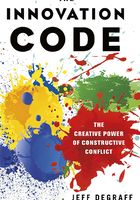
Preface
The discord in the early moments of a brainstorming session is like a symphony: the tense back and forth between wildly different thinkers, the points of antagonistic contact between totally opposing worldviews. When it comes to any innovation initiative —from building the next breakthrough app to designing the next miracle drug—disharmony is crucial. The only way to create new hybrid solutions is to clash. Innovation happens when we bring people with contrasting perspectives and complementary areas of expertise together in one room. Innovation is unlike any other form of value or growth because it’s the only kind that necessitates discomfort. It requires us to not get along. We innovate when we disrupt, and we first have to disrupt each other. It’s best that we innovate not with people we agree with but with people who will challenge us. Forget everything you’ve ever heard about teamwork and harmony. It’s time to ruffle some feathers.
This is precisely what the The Innovation Code: The Creative Power of Constructive Conflict is about. This book introduces a simple framework to explain the way different kinds of thinkers and leaders can create constructive conflict in any organization. There are four fundamental kinds of innovators. Each of these innovators holds dear a different value proposition, which guides the way each thinks and acts. Understanding how these four kinds interact and work against each other will help you facilitate innovation in your organization and life. This book is derived from our experience in working with nearly 200 of the Fortune 500 companies across the globe, jumpstarting creative growth in a variety of fields from healthcare to entertainment to manufacturing. With this book, we’ve distilled our years of experience into a clear, step-by-step guide to navigating innovation teams and harnessing the energy of constructive conflict.
The Innovation Code contains the interactions between the four basic approaches to innovation, represented by the four different kinds of dominant worldviews or value propositions in any business. There’s the wild experimentation of the Artist, the pragmatic caution of the Engineer, the quick competitiveness of the Athlete, and the patient community building of the Sage.
The four dominant worldviews come together to produce a positive tension, a constructive conflict that generates sustainable growth. When outside-the-box Artists clash with by-the-book Engineers, the result is innovation that’s simultaneously revolutionary and sensible. When aggressive, profit-hungry Athletes clash with empathic, high-minded Sages, the result is innovation that’s at once winning and conscientious.
This book shows you how each of these four types functions and how to build, manage, and embrace the dynamic discord of a team that contains all four elements of the Innovation Code. There is a short assessment that you can take at the end of Chapter 2 to see how you fit into the four types. Please see The Innovation Code Supplemental Material section on page 129 for more information about online assessments and other supporting materials. But for now, it’s time to get uncomfortable, to talk to people you don’t agree with, to collaborate with thinkers who might otherwise be your rivals, even your enemies. Let’s get disruptive.